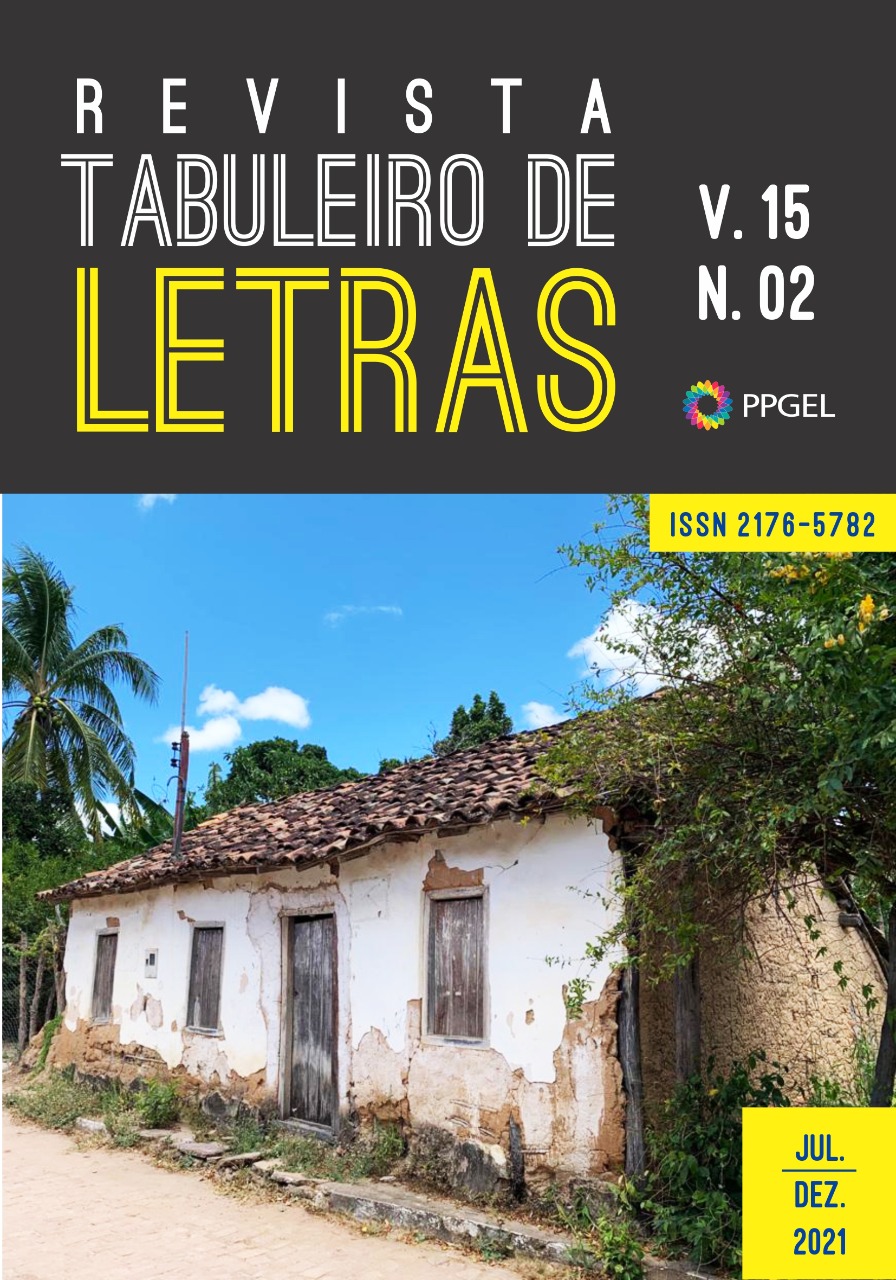Pausas preenchidas na fala espontânea de pacientes com esquizofrenia: comparação entre pacientes e não pacientes
DOI:
https://doi.org/10.35499/tl.v15i2.11889Resumo
: O objetivo deste trabalho é fazer uma comparação entre a frequência de ocorrência e duração de pausas preenchidas na fala espontânea de pessoas com esquizofrenia. A hipótese é de que haveria mais pausas e de maior duração na fala de pessoas com esquizofrenia do que no de pessoas sem essa condição. Metodologicamente, utilizamos 6 áudios e suas respectivas transcrições do C-ORAL-ESQ (FERRARI, ROCHA, em construção) e 6 do C-ORAL-BRASIL (RASO, MELLO, 2012), a partir dos quais foram demarcadas as pausas preenchidas. Para extração, tratamento dos dados e análise estatística foram utilizadas bibliotecas da linguagem Python. Os resultados mostram que pacientes com esquizofrenia realizaram maior quantidade de pausas e com maior duração, quando comparados por corpora, e pausas geralmente maiores quando comparados individualmente, com resultados estatisticamente relevantes no teste U de Mann Whitney (p < 0,05) para a diferença registrada na duração das pausas. Esses resultados sugerem que pacientes com esquizofrenia hesitam mais na fala espontânea do que pessoas sem esquizofrenia, mas ainda é necessário estudar o contexto no qual cada uma das 94 pausas encontradas ocorreram para categorizá-las como de fato uma disfluência.
Downloads
Referências
ALPERT, Murray, CLARK, Aileen, POUGET, Enrique. The syntatic role of pauses in the speech of schizophrenic patients with alogia. Journal of Abnormal Psychology, vol. 103, n. 4, 1994, pp. 750-757.
ANDREASEN, N. C. Positive and negative symptoms in schizophrenia. A critical reappraisal. Archives of General Psychiatry 1990, vol. 47, pp. 615-621.
ANDREASEN, N. C., & Grove, W. M. Thought, language and communication in schizophrenia: Diagnosis and prognosis. Schizophrenia Bulletin, 12, 1986, pp. 356-359.
ANDREASEN, N. C. A scale for the assessment of thought, language and communication (TLC). Schizophrenia Bulletin, 12, 1986, pp. 473-482.
BIBER, D. Representativiness in Corpus Design. Literary and Linguistic Computing, Vol. 8, No. 4, 1993. Disponível em: http://otipl.philol.msu.ru/media/biber930.pdf
BLACK, D; GRANT, JON. The essential companion to the diagnostic and statistical manual of mental disorders. Fifth edition. Washington D.C; Londres; American Psychiatric Publishing, 2014.
BOER, J. N de et al. Language in schizophrenia: relation with diagnosis, symptomatology and white matter tracts. Revista Nature, v. 10, 2020, pp. 1-10.
BORTFELD, H et al. Disfluency Rates in Conversation: Effects of Age, Relationship, Topic, Role, and Gender. Language and Speech, n.44(2), 2001, pp. 123-147.
BUTTERWORTH, B.L. Evidence for pauses in speech. In: Butterworth, B.L. (ed) Language Production, 1, Speech and Talk. Londres, London Academic Press, 1980.
ÇOKAL, Derya, et al. Disturbing the rhythm of thought. Speech pausing patterns in schizophrenia, with and without formal thought disorder. PLOS ONE, n. 14 (5), 2019, pp. 1-14.
COMPTON, M.; LUNDEN, A.; CLEARY, S. et al. The aprosody of schizophrenia: Computationally derived acoustic phonetic underpinnings of monotone speech. Schizophrenia Research, n. 197, 2018, pp. 392–399.
CONDRAY, R.; STEINHAUER, S. R.; VAN KAMMEN, D.P.; KASPAREK, A. The language system in schizophrenia: Effects on capacity and linguistic structure. Schizophrenia Bulletin, 28, 2002, pp. 475-490.
COVINGTON, M. A. et al. (2005). Schizophrenia and the structure of language: The linguist's view. Schizophrenia Research, 77, 85-98.
ESPOSITO, Anna et al. The significance of empty speech pauses : cognitive and algorithmic issues. The Significance of Empty Speech Pauses: Cognitive and Algorithmic Issues. In: Mele F., Ramella G., Santillo S., Ventriglia F. (eds) Advances in Brain, Vision, and Artificial Intelligence. BVAI 2007. Lecture Notes in Computer Science, vol 4729. Springer, Berlin, Heidelberg, 2007, pp. 542-554.
FELDSTEIN, S, JAFFE, J. Schizophrenic speech fluency : a partial replication and a hypothesis. Psychological Reports, n.13, 1963, pp-775-780.
LIDDLE, P. F., NGAN, E. T. C., CAISSIE, S.L. et al. Thought and language index: An instrument for assessing thought and language in schizophrenia. British Journal of Psychiatry, n. 181, 2002, pp. 326-330.
LIN, Y, DING, H, ZHANG, Y. Emotional prosody processing in schizophrenic patients: a selective review and meta-analysis. Journal of Clinical Medicine, n.7, 363, pp.1-26.
MATSUMOTO, K. et al. Frequency and neural correlates of pauses in patients with formal thought disorder. Frontiers in Psychiatry, 2013, vol. 4, article 127, pp. 1-9.
MORICE, R. D., & Ingram, J. C. L. Language complexity and age of onset of schizophrenia. Psychiatry Research, 9, 1983, pp. 233-242,
KUPERBERG, G. Language in Schizophrenia. Part 1: An Introduction. Language and Linguistics Compass n.4, vol.8, 2010, pp. 576–589.
O’CONNEL, Daniel C., KOWAL, Sabine. Pausology. Computers in Language Research 2. Walter de Gruyter e CO, Berlim; Nova Iorque, 1983.
OGATA, J., GOTO, M., ITOU, K. The use of acoustically detected filled and silent pauses in spontaneous speech recognition. ICASSP 2009 : IEEE International Conference on Acoustics, Speech and Signal Processing. Anais, pp. 4305-4308.
RASO, T.; MELLO, H. (Eds.). C-ORAL-BRASIL I: Corpus de referência do português brasileiro falado informal. 1. ed. Belo Horizonte: Editora UFMG, 2012.
ROCHA, B.N. O corpus C-ORAL-ESQ e a estrutura informacional da fala de pacientes com esquizofrenia. Working papers em Linguística, 20 (1), pp. 212-238.
STEUBER, L.C. Disordered Thought, Disordered Language: A corpus-based description of the speech of individuals undergoing treatment for schizophrenia (2011). Dissertations and Theses. Paper 63.
Downloads
Publicado
Como Citar
Edição
Seção
Licença
Autor(es) conservam os direitos de autor e concedem à Revista o direito de primeira publicação, com o trabalho simultaneamente licenciado sob a Licença Creative Commons Attribution que permite a partilha do trabalho com reconhecimento da autoria e publicação inicial nesta Revista.

















